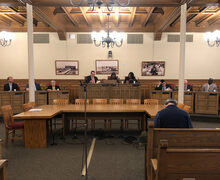New York University students develop app to send leftover food to service organizations
Tony Chao | Art Director
Two juniors at New York University are creating a website and app to tackle hunger with a simple idea: connect corporate events with leftover foods to social institutions that can redistribute it.
“Our premise is that giving away your food should be as easy as wasting it,” said Hannah Dehradunwala, one of the co-founders of Transfernation.
In March, Transfernation co-founders Dehradunwala and Samir Goel were named fellows in the Resolution Project’s competitive Social Venture Challenge and awarded seed funding for their project. Dehradunwala said they hope to have completed the website, their primary platform, by Saturday, and to launch the app by late 2015.
Even though the website and app aren’t finished yet, Dehradunwala and Goel have already put their idea into practice. They arranged for the Bowery Mission, a service organization, to pick up leftover food after an NYU event and did the same for the Resolution Project’s annual gala, after which 85 pounds of extra food was transferred.
Dehradunwala said Transfernation offers corporations more than the satisfaction of doing a good deed. Currently, she said, corporations hosting events have to pay for leftover food to be disposed of, whereas Transfernation offers an opportunity for the food to be donated to soup kitchens and missions for free.
“Right now, corporate social responsibility has become such a huge thing that corporations want to improve their image,” Dehradunwala said. “So basically what we tell them is that we’re gonna take your food completely free, and do something better with it that’s gonna make your corporation look good.”
Finding corporate partners was a challenge in the beginning, Dehradunwala said, “but recently we’ve been having this huge influx of partners that want to sign on with us.” Transfernation is already partnered with the corporation that hosts events at the Harvard Club and is in the process of partnering with NYU so that all extra food from all NYU events is donated in the future. She added that the Transfernation team is talking with several other corporations in hopes of officially partnering with them soon.
Now, Dehradunwala said, she and Goel are trying to find and partner with enough social institutions that have the capacity to pick up food.
“We’ve been looking, but a lot of them have very stringent food laws, so we’re trying to find institutions that would be willing to pick up extra from the events that we partner with,” she said. “So now that’s our biggest challenge.”
Dehradunwala said she would love to continue expanding Transfernation after graduation, ideally turning it into a job, since she has always been interested in the problem of hunger. Her family moved around a lot when she was a child, she said, and as a result of her years spent in the United States, Pakistan and Saudi Arabia, she was able to see firsthand how different cultures treat food and waste.
“In America, I realized that because there’s so much excess, resources are so readily available to everyone, it’s so easy to get extra, it’s so easy to get more, that people don’t really think twice before they waste it,” Dehradunwala said.
Whereas in Pakistan, she said, “you do think twice because you see poverty all around you, so before you choose to throw away a plate of food you think there’s naturally someone out there who could take it.”
Transfernation’s ultimate goal, Dehradunwala said, is to create “a cultural change in mindset” so that people are conscious of the alternatives to throwing food away.
“We want to change the way that people see their extra food,” she said.
Published on November 13, 2014 at 12:01 am
Contact Maggie: mmcregan@syr.edu





